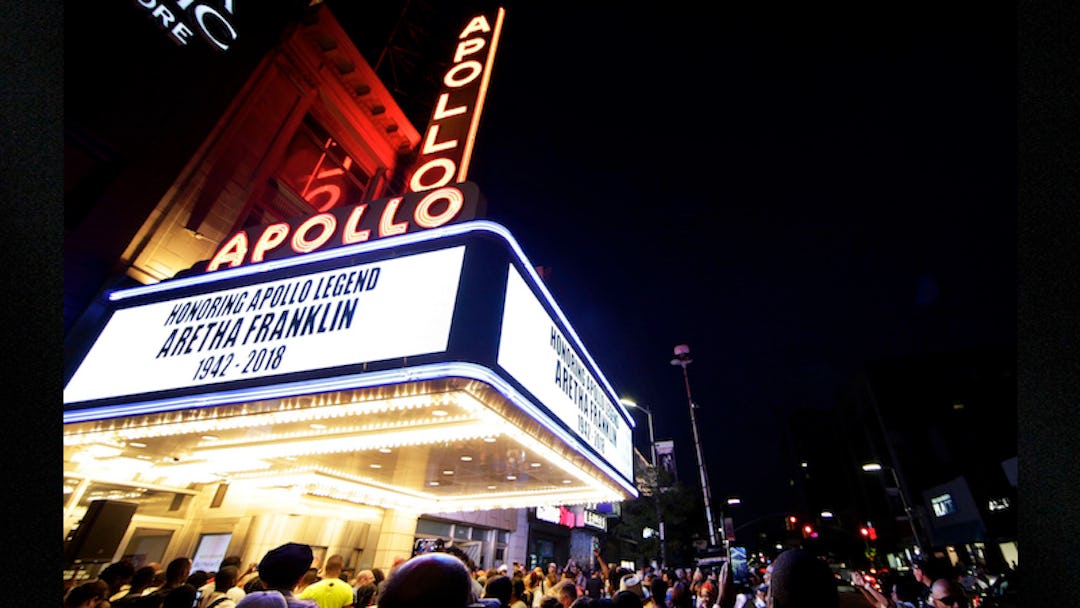Modern online media is all about the signal boost, so every Friday here at Flavorwire, we take a moment to spotlight some of the best stuff we’ve read online this week. Today, a thoughtful examination of one of our most reliable actors; a word of warning about politics and media; and two tributes, one in words and one in pictures, to two music icons.
Joyce Millman on the legend and legacy of Aretha Franklin.
The Queen of Soul died Thursday morning at age 76, leaving behind a deep library of powerful soul, gospel, and blues. Music critic and essayist Millman tussles with who she was and what she meant, via some of her best music and moods.
Aretha’s music is godly, lusty, turbulent, ecstatic, glistening. She spans musical styles and decades, while always remaining Aretha. She is the Queen of Soul, the reverend’s daughter, the woman who shows other women how to demand R-E-S-P-E-C-T, whose voice gave voice to torrential grief at Rev. Martin Luther King Jr.’s funeral and soaring joy at President Barack Obama’s first inauguration… Aretha is the soul of black America, she is the soul of America, period. She is soul music, and the music of the soul. Aretha, simply, is. And will always be.
Photographer Kevin Mazur on shooting, and geeking out on, Madonna.
As one legend passes, another pushes forward. Yesterday also marked the 60th birthday of the one and only Madonna, and over at Getty Images’ FOTO blog, Mr. Mazur tells the story of how he went from a New York club kid and early Madge superfan to the guy taking photos of her performances for Rolling Stone (“I started bringing my camera to shows for fun, and eventually it turned into a job”).
In the years before he became a renowned entertainment photographer, Kevin Mazur was a young man from Long Island who loved music and loved Madonna. One night in the early 1980s, he ran into her while out with friends at Danceteria, the legendary New York nightclub where she was a regular among such future luminaries as Keith Haring, Jean-Michel Basquiat, LL Cool J, and Sade. Madonna was barely older than a kid herself and just starting to break big. “We were out having a good time and, bam, there she is,” Mazur tells FOTO. “Like a little kid, I freaked out. She looked just like the album cover, with all the bracelets and the hair. And I’ll never forget: The club photographer took my picture with her, but I never got the photo. It kills me, to this day. Somewhere that picture exists.”
At Splinter, Hamilton Nolan sounds a note of warning to the political media.
The reliably indignant Mr. Nolan uses the worrisome notion of a “Michael fucking Avenatti” presidential campaign to point out that those who cover the national political stage – and thus are always on the lookout for A Story – could somehow continue to make the same mistakes as they made in 2016. (Bonus: he also refers to Donald Trump as “a flaxen-haired buffoon entertainer whose primary role in American society for most of his life has been to act as human shorthand for ‘rich clown'”.)
All politicians try to capitalize on the media for their own ends. But never has the media played such a crucial role in creating a president from scratch. This is new. And the fact that Trump actually fucking won should make everyone in the political media—in particular, those who view their role as more or less neutral arbiters of The Story—gasp in horror at their own power. The entire non-Trump-voting nation has been doing a constant series of gut checks for the past two years. The media’s gut check is one of the most meaningful of all. This is not the old debate about whether objectivity really exists, or whether the mainstream media is biased towards liberalism or conservatism. This is about the need for the media to recognize its own effect on what it purports to be covering. Genuinely or not, news outlets have always defaulted to the explanation that they cover rather than create reality. That is no longer credible. For the slice of the press that does have a genuine desire not to be wielded as a mere political tool, it’s time to get your shit together.
And finally, Keith Phipps on Ethan Hawke for The Ringer.
Ethan Hawke is quite good in the new (not nearly as good) romantic comedy Juliet, Naked, playing something of an older, washed version of his Gen-X poster boy in Reality Bites . Phipps examines how we’ve watched Hawke age – in those roles, in the Before films, and in Boyhood– as we’ve done the same.
The changes Jesse goes through in the Before films aren’t specific to Gen X, but having Hawke in the role makes the association unavoidable. Here’s where being a generational icon can enhance a performance rather than weigh it down. Disappointment, free-floating disenchantment, marital woes, unexpected passions, political disillusionment, and newfound fears come to every generation, but do they ever not come as a shock? I’m almost exactly the age of Hawke’s Before character, and with each new installment I’ve heard concerns I once never thought would come into my own life—some I’ve experienced firsthand, some I’ve seen my friends go through, some I’ve seen as paths not taken—echoed on screen. Each installment feels like checking in with an old acquaintance, but also a whole generation. How are we doing? What’s worrying us now? Are we going to make it?
